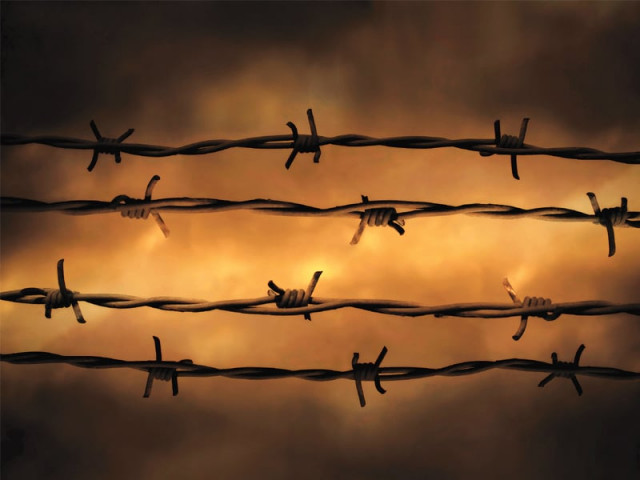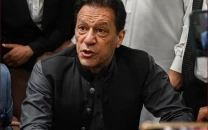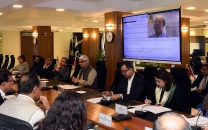Intelligence agencies: A failure to communicate
Whether Pakistan can win this war depends on how effectively its leadership can integrate intelligence.

The enemy is within the gates, not easily identifiable and growing increasingly capable of carrying out audacious and well-planned attacks. The latest was the 16-hour siege of the naval air base PNS Mehran in Karachi, similar in style and execution to the attack on the Pakistan Army’s General Head Quarters in 2009. The vulnerability of Pakistan’s armed forces has never been brought as sharply into focus.
The 48 hours of silence after Osama bin Laden’s killing in Abbotabad by the CIA and US Seals, from both the civilian and military authorities were deafening. Then came the recriminations, the parliamentary resolutions and the thundering and moaning on the airwaves about intelligence failures. But no substantive action was taken.
“We have no focal point,” says former foreign minister Shah Mehmood Qureshi. “We have had no foreign minister in five months and the PM is occupied with other matters. The world cannot wait for you. They need action and reactions.”
It took the attack on PNS Mehran and murmurs about the safety — or lack thereof — of Pakistan’s nuclear installations to finally wake up the prime minister, and the Defence Committee of the Cabinet ordered law enforcement agencies to take all necessary action to combat domestic terrorism. So once again, we are going to rush into military action without taking the critical steps of gathering intelligence, analysing the data and proceeding with a coherent multi-pronged strategy. The PPP government’s inevitably short-sighted and kneejerk reactions are unlikely to establish any sense of direction.
“The position of the government is compromised,” says PML-N legislator and spokesman Ahsan Iqbal. “Because they sought US and UK assistance with the NRO (National Reconciliation Ordinance), they have to follow their policies. We need indigenous solutions presented by a government that has the trust of the people.”
But an informed policy needs a strong foundation. The biggest loophole in prosecuting the war in Pakistan is the complete lack of a national security agenda, a key element of which is integrating intelligence information effectively. “Within the national security framework, intelligence is crucial,” says former national security adviser General (retd) Mehmood Ali Durrani. “If you don’t have proper intelligence, other actions cannot take place.” The concept of integrating intelligence efforts, he says, has been missing for years. “We need this now in a complex world where national security needs to involve defence, foreign affairs, finance and internal security.”
And Pakistan has a gaping void when it comes to coordinating intelligence amongst different agencies. Pakistan’s largest intelligence gathering network is the Inter-Services Intelligence (ISI) whose primary function is to deal with external threats to the country. Maintaining internal stability is theoretically the purview of the civilian agency known as the Intelligence Bureau (IB). However, there are several other intelligence agencies operating in the country, including Military Intelligence (MI) the Federal Investigation Agency (FIA), and provincial intelligence departments known as the Special Branch of the Central Intelligence Department. (see ‘The Agencies’)
“Every intelligence agency has a specific purpose,” says Durrani. And each agency jealously guards its turf.
Durrani held the critical position of national security adviser (NSA) for only seven months, during which time he says he sought to build up the level of the IB to the same as the ISI. Reporting directly to Prime Minister Yusuf Raza Gilani, Durrani soon ran into bureaucratic hurdles with one minister even questioning if Durrani was trying to create a ‘super ministry’. It’s not just the agencies who have turf wars.
“There is something we call an intelligence cycle — collection, collation, interpretation and dissemination,” says General Durrani. Former intelligence officials say every intelligence agency follows this cycle. But the inherent flaw is that without centralising the information either in raw data form or at the interpretation stage, key information is either not communicated up the chain of command or someone fails to connect the dots.
“We work in tight compartments and information is analysed before it can be presented as intelligence,” says a senior army official. He agrees that a centralised system is required, pointing out that the National Counter Terrorism Authority (Nacta) was envisioned with this goal in mind. “Having someone like General Durrani as national security adviser is also a workable solution,” the senior official says.
“Agencies work in vertical silos,” says Ahsan Iqbal. He argues for the need to coordinate data at the low, mid and senior levels for effectiveness.
But the lackadaisical attitude of the government towards this critical function can be gauged by the fact that the well-respected Tariq Pervez who was appointed as the first Chairman of Nacta resigned within the year and the organisation never got off the ground. “Nacta exists only on paper,” says Shah Mehmood Qureshi. “The interior minister seems preoccupied with other matters and is not focused on this issue.”
“Nacta should be activated,” says PPP leader Qamar Zaman Kaira. But he maintains the role of Nacta was in terms of combating terrorism and developing policy, not just coordinating intelligence. Whatever the rationale, the government in the midst of fighting a major war is without a national security adviser, a foreign minister or a system like Nacta.
The system itself is flawed in many respects, dependent on individuals to function adequately. According to Qureshi, when he was the foreign minister, there was no institutionalised system of sharing information or intelligence and he did not routinely get intelligence briefs. “At times, I had to take the initiative myself to get input and engage with the ISI. I personally had a good relationship with them and they were very cooperative. But there was no institutionalised mechanism.”
This virtually ensures that key information required to formulate policy is going to be ignored. A large amount of data is generated every day, says former IB chief Masood Sharif Khattak. “Data is focused into points of interest and this is filtered and developed into leads,” he explains. The military, he says, has mechanisms set in place but this is missing in the civilian administration. “There is nothing in the prime minister’s secretariat to deal with all the reports coming in and no assessment is done. The final picture should be presented to the boss but it doesn’t always happen. Systems need to be created.”
According to former president General Pervez Musharraf, when he was president and army chief, all intelligence coordination was handled by the Director General of the ISI. “The heads of the ISI, IB and MI would meet once a week, led by the DG ISI. A fully developed factsheet with intelligence developed from confirmed information would be provided to me,” he says.
The system worked, says Musharraf. “I would even call up the heads of the ISI, IB and MI and call them in for meetings. The direction was clear from the top and there was unity of command.” But that worked when Gen. Musharraf wielded absolute power – the system was dependent on one man.
Masood Sharif Khattak agrees there was uniformity of command in the Musharraf years but there is a tendency by military rulers to treat civilian agencies with less respect. The military agrees there is a divide between the military intelligence apparatus and their civilian counterparts. Intelligence gathering has to be at the thana level, Khattak says. But the police needs to be handled better. “Political whims result in the appointment of IGPs. There is no merit or professionalism.”
The military agrees this is a problem. “We have to depoliticise the police,” says a military official. The army, he says is trained to deal with insurgents and countering terrorism in cities and towns is best handled by local law enforcement.
There seems to be a general consensus that Pakistan needs a national security adviser, Nacta or an organisation like Homeland Security. But just creating the office on paper will not be enough. The first Nacta chairman did not have any staff or resources to do his job. Durrani says his office was never properly established with the right mix of people. “The leadership didn’t understand this. They did not have the vision,” he says.
There are however differences of opinion on the constitution of an organisation such as Nacta. Musharraf argues that the system is ingrained and creating a supra-intelligence agency may be counterproductive. Ahsan Iqbal suggests that any such organisation should be a sub-committee of the Defence Committee of the Cabinet with a permanent secretariat. He points out there are no rules or framework for intelligence agencies at all.
But there are mixed opinions on civilian oversight of intelligence operations. While politicians believe civilian oversight is a must, much of that seems to be predicated on the fact that intelligence agencies have been drawn into spying on opposition politicians over the years and playing an unsavoury role in the political landscape. And the military is downright reluctant when it comes to civilian oversight. “Intelligence is secretive by nature. Our legislators have to be backed up by think tanks and given briefings. We cannot afford to have our assets compromised,” says a senior military official, pointing out that details of the in-camera session of Parliament in the wake of the bin Laden killing were being broadcast on national television even as the session was in progress.
Musharraf is even blunter. “Theoretically it is a good idea to have parliamentary oversight. But intelligence agencies lack confidence in Parliament. Confidentiality is not maintained and this is a problem.”
With or without civilian oversight, it is clear that the government needs to act fast on the intelligence front if it is going to tackle terrorism effectively. The military seems to be comfortable working with a civilian head of any such supra agency — such as Nacta — that reports to the prime minister. But it has a rigid mindset and the bureaucracy is just as set in its ways.
So the ball is now in the court of the political leadership to create not just an effective equivalent of a national security agency, that combines the efforts of the country’s myriad intelligence agencies, but also to staff it with people who can wargame unconventional strategies, offer solutions and work on breaking new ground in combating terrorism. Without it, we may find that this failure to communicate may lead to a failure of the state itself .
The Agencies
There are at least a dozen intelligence agencies and federal investigation units operating in Pakistan.
Inter-Services Intelligence (ISI)
Mandated to coordinate intelligence services and conduct counter-espionage, Pakistan’s most powerful spy network technically comes under the government’s ministry of defense headed by federal minister Ahmed Mukhtar. However, the ISI Director General Lieutenant General Shuja Pasha is widely believed to report directly to Chief of Army Staff General Ashfaq Pervez Kayani only.
Military Intelligence (MI)
The Directorate for Military Intelligence is mainly concerned with identifying threats and anti-state agents working to sabotage the armed forces. This intelligence agency theoretically reports to the Ministry of Defense, but is in fact answerable only to the Army chief. Air Intelligence, Army intelligence and Naval intelligence are all branches of the MI
Intelligence Bureau (IB)
This civilian intelligence agency comes under the Ministry of Interior’s direct control. Its mandate is limited to gathering intelligence and identifying internal threats to the country. It liaisons with the Pakistan police force and passes on critical security-related information to civilian law enforcers.
Directorate of Customs Intelligence and Investigation, Inland Revenue
This is the Federal Board of Revenue’s intelligence wing, it gathers information on evasion of customs, federal excise duties, sales tax and smuggling of contraband
Financial Monitoring Unit
Also known as the Financial Intelligence Unit, this body assists domestic law enforcement agencies and regulators in detection and prevention of threats emanating from money laundering and terrorist financing activities. It comes under the Ministry of Finance and is headed by a director general.
Federal Investigation Agency (FIA)
The Federal Investigation Agency comes under the jurisdiction of the Ministry of Interior. It deals with counter terrorism, anti-corruption, human smuggling and copyright infringement operations.
Crime Investigation Department (CID)
This is a specialised unit of the provincial police departments that investigates high profile terrorism and criminal cases. Each CID unit is headed by the provincial Inspector General of Police. Many urban centres also have a separate specialised unit apart from the CID that operates directly under the command of the Capital City Police Officer.
Anti Narcotics Force (ANF)
The Anti Narcotics Force comes under the Ministry of Defence and is headed by a senior military officer. Its main concern is drug trafficking, eradication of drug supply and trafficking and organising rehabilitation programmes.
Airport Security Force (ASF)
This is the first line of defence at airports throughout Pakistan and is handled by the Ministry of Defence.
Coordinating intelligence
The United States – greater centralisation after 9/11
To counter what was seen as a massive intelligence failure in the US after 9/11, the Office of the The Director of National Intelligence (DNI) was created in 2004. The DNI is now the leader of the United State’s large intelligence community. Before the office of the DNI was created, the intelligence community was led by the Director of Central Intelligence (DCI), who was also the Director of the Central Intelligence Agency (CIA). The CIA is now coordinated by the DNI, which reports directly to the President.
The agencies he coordinates are: The Central Intelligence Agency (CIA), Federal Bureau of Investigation (FBI), Department of Defense (DOD) Defense Intelligence Agency (DIA), National Security Agency (NSA), National Geospatial Intelligence Agency, National Reconnaissance Office (NRO), Air Force Intelligence, Marine Corps Intelligence, Army Intelligence, Naval Intelligence, Department of State, Department of Energy (DOE), Department of Treasury, United States Coast Guard, Department of Homeland Security and The Drug Enforcement Administration (DEA). The DNI also oversees the National Counterterrorism Center (NCTC), which is staffed by terrorism experts from the CIA, FBI, and the Pentagon; the Privacy and Civil Liberties Board; and the National Counter Proliferation Center.
The United Kingdom – ministerial oversight
The UK has three intelligence and security services, collectively known as the Agencies – the Secret Intelligence Service (better known as MI6), Government Communications Headquarters (GCHQ) and the Security Service, sometimes known as MI5.
The agencies operate under the immediate control of their respective heads who are personally responsible to ministers.
However, the Prime Minister has overall responsibility for intelligence and security matters and is supported in that capacity by the Secretary of the Cabinet. The Home Secretary is responsible for the Security Service; the Foreign Secretary for MI6 and GCHQ, and the Secretary of State for Defence for the DIS. There is also a Ministerial Committee on the Intelligence Services (CIS), whose Terms of Reference are: “to keep under review policy on the security and intelligence services”.
The Prime Minister is its chairman and the other members are the Deputy Prime Minister, Home, Defence and Foreign Secretaries and the Chancellor of the Exchequer.
Part of the Cabinet Office, the Joint Intelligence Committee (JIC), advises the government on priorities for intelligence gathering and for assessing its results. The JIC provides regular intelligence assessments on issues of national interests, like security, defence and foreign affairs. Intelligence reporting from the Agencies is also used to support field operations by the Armed Forces and by law enforcement agencies. Relationships between the Agencies and those who use their intelligence are close and as transparent as possible.
India – Executive control
In India, the National Security Council (NSC) looks into the country’s strategic concerns. The NSC comprises the Strategic Policy Group, the National Security Advisory Board and a Secretariat represented by the Joint Intelligence Committee (JIC). It is the JIC that is responsible for analysing intelligence data from India’s main intelligence units: the Intelligence Bureau, the Research and Analysis Wing (commonly known as RAW), and the Directorates of Military, Naval and Air Intelligence. The JIC has its own Secretariat that works under the Cabinet Secretariat, and critics of the system say that because of this, the JIC is mostly not answerable to the Cabinet.
The Intelligence Bureau is responsible for internal intelligence, and RAW is responsible for external intelligence. In contrast to the British method of sharing intelligence, the structure and operations of RAW are said to be kept largely secret from Parliament, and the agency operates directly under the Prime Minister.
Published in The Express Tribune, Sunday Magazine, June 5th, 2011.



















COMMENTS
Comments are moderated and generally will be posted if they are on-topic and not abusive.
For more information, please see our Comments FAQ